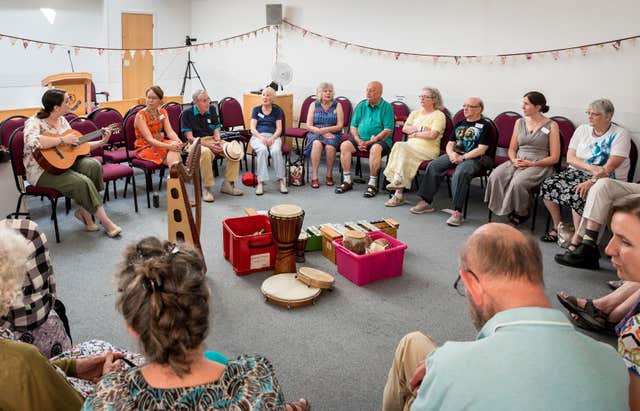
A GP has called for fellow doctors to prescribe singing as an alternative to medicine.
Dr Simon Opher said he sees patients less often if they join a singing group or a choir because singing has a wide range of health and social benefits.
Music therapy has already been used successfully in care homes for sufferers of dementia and singing can also help people with Parkinson’s disease.

The Gloucestershire-based GP said: “People see me less if they start singing.
“I can be a bit dangerous as a doctor because I can do tests that are not necessary, perhaps tablets and inhalers that are not necessary.
“I really support the fact they are engaging in something and really enjoying it and not coming to see me as much.
“There is some quite strong data that supports that. They tend to use less health resources generally.
“In terms of funding this is something the NHS is really backing now.”
Dr Opher went on: “As I doctor I think you’ve really got to persuade the medical profession of the benefit and that can take some doing.
“But if doctors are listening, it’s really important you start thinking about these types of remedies because it makes a patient better in lots of generalised ways as well, as well as in these specific ways of breathing and dementia.
“It’s not a panacea but it can really help your work as a doctor.
“You have to build on what’s there in the community and every community I’ve ever come across has people singing.
“Find those people and start using them, rather than create something new for yourself.”
Dr Opher was speaking during an event at the Cheltenham Science Festival, discussing whether singing can improve health.
“In dementia there is some evidence that when we sing there is an area of our brain that gets more blood flow and they are the ones that usually preserved in dementia,” he said.
“When you hear a song it sometimes does something weird to you and does something really strong and visceral.
“That feeling is really important and really awakens patients with dementia and makes them feel more involved.”
He also said that research has shown that singing can help people with Parkinson’s because it improves the loudness of their voice, which can be weakened by the disease.
“There are lots of adaptations and perhaps we are only touching the surface of getting into other areas of disease that we can help people with.”
Dr Daisy Fancourt, a senior research fellow at UCL, said a link between arts and health can be traced back over millennia and singing has been shown to help improve heart rate, blood pressure, mood and depression.
“But over the last couple of decades we’ve started to have real scientific evidence about how and why singing can have these health benefits,” she said.
“I like to think of singing as a multi-model health activity because it has lots of different components that we already know are good for health.
“Singing involves emotional expression and regulation, which we know is good for mental health.
“Singing can also help us get out of the house, so reducing those sedentary behaviours that can be bad for physical health.
“It can also provide social interaction to reduce feelings of isolation.
“We are really starting to understand a lot more about the psychological and biological and behavioural mechanisms that link these aspects of singing with health.
“What is good here is that, while a lot of health interventions may not be particularly fun to engage in, singing is not a medical activity, it’s a fun hobby and leisure activity.
“Therefore there is an intrinsic motivation to do singing and therefore acquire those health benefits.”
Dr Fancourt said attending musical concerts also has a positive effect on health.
“There was almost the same biological reduction in stress from classical music concerts as from rock concerts, which might sound strange but underlines the contextual factor that going to concerts is often a relaxing activity regardless of the genre,” she added.


Comments: Our rules
We want our comments to be a lively and valuable part of our community - a place where readers can debate and engage with the most important local issues. The ability to comment on our stories is a privilege, not a right, however, and that privilege may be withdrawn if it is abused or misused.
Please report any comments that break our rules.
Read the rules here